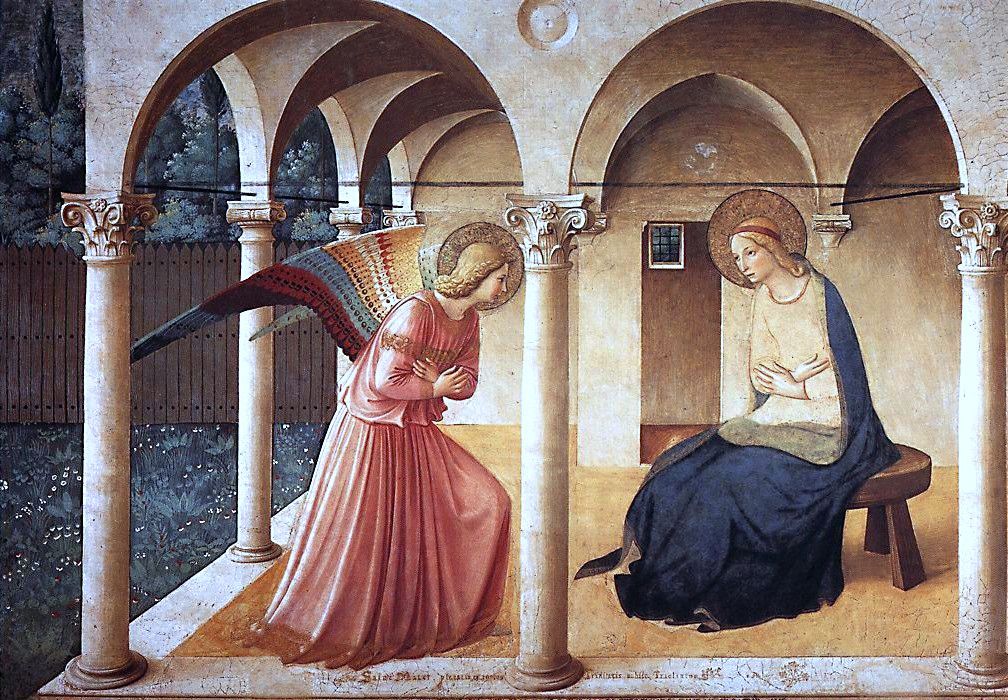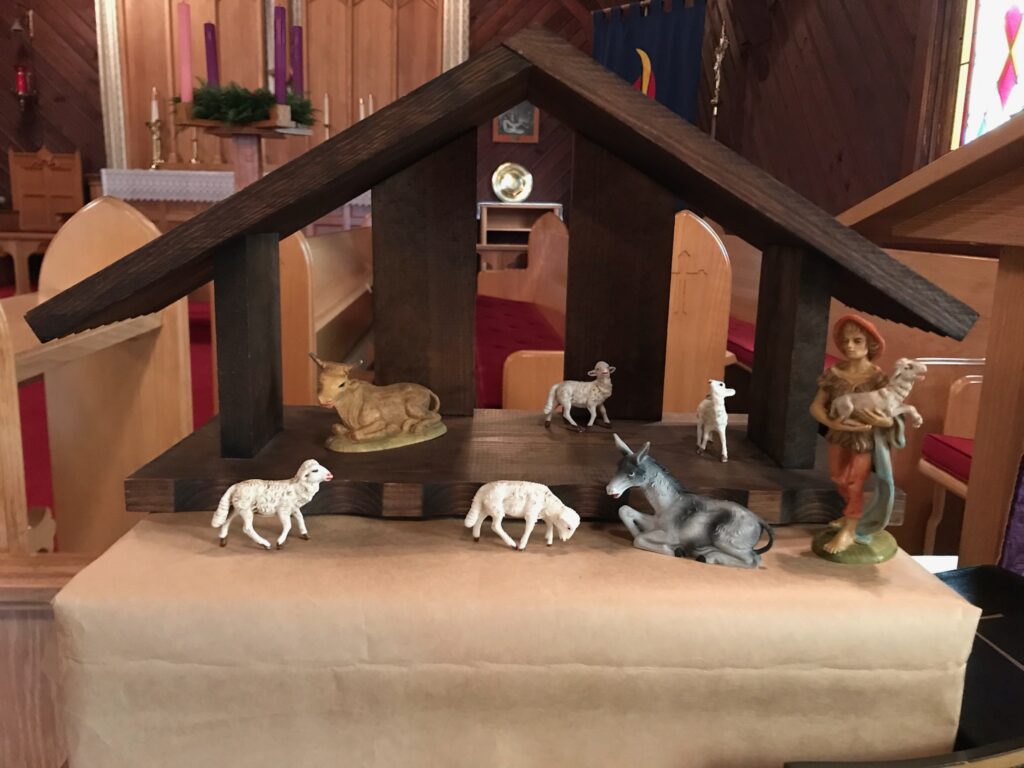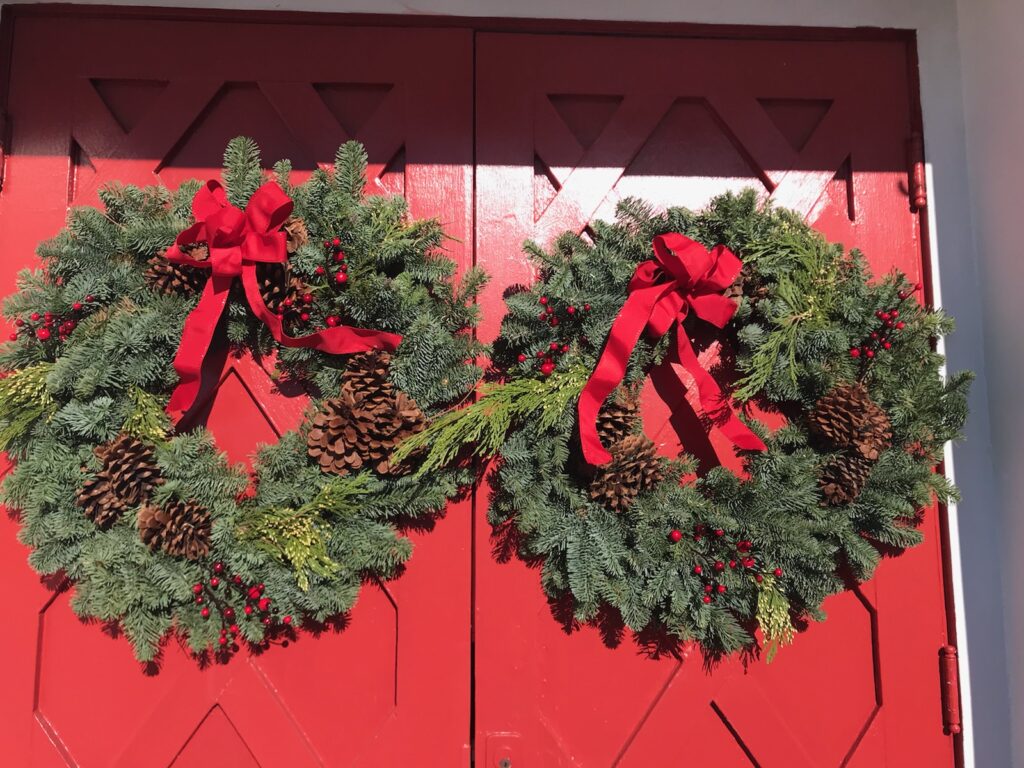
the fourth Sunday of Advent
December 20, 2020
2 Samuel 7:1-11, 16
Psalm 89:1-4, 19-26
Romans 16:25-27
Luke 1:26-38
Click here for these readings.
We come this morning, in the eleventh hour before Christmas, on this the fourth Sunday of Advent, to one of the greatest moments in the history of our faith: the Annunciation. Now, I know I say this a lot. I think, over the past few months, we’ve come to many different “best parts” of the Bible. Jesus’ sermon on the mount, the beatitudes, the garden of Gethsemane, where Jesus prays for the cup to be taken from him – but not my will, he says to God, but yours. There’s the crucifixion and the Resurrection, the 23rd Psalm and the giving of the Ten Commandments and, you know, the whole creation story, too. All of it is magnificent, and it is a joy to spend our days hearing these magnificent stories again and again, pondering them and considering them, together or alone in the quiet of our rooms, while talking together or deep in our heart of hearts.
And today, this very morning, we have another: the Annunciation, the moment of Incarnation, the request of God – not the demand, not the inevitability, not the violent act, but the request of God to a young woman named Mary and her “yes” that met God in hope and joy. And, of course, the Incarnation, the birth of Jesus Christ, our Savior, that came from this meeting.
Just like the crucifixion, just like the resurrection, and just like so many different parts of Jesus’ life and ministry, this short story in the book of St. Luke has been read, considered, pondered over, and contemplated by the Church for two thousand years. And in the art of those who chose to draw or paint this scene, there’s something really beautiful that so often happens. When Gabriel comes into Mary’s room to say, perhaps, with a loud, booming voice, to give a message and a request maybe to the sound of trumpets and great fanfare, to announce God’s pleasure and joy and hope for humanity, the angel always finds Mary doing one thing: reading. Whether she has her book open on a table and is sitting back regally, looking over it with calm eyes, or, she’s got her nose stuck in the book, hiding away in its joys, Mary is always reading in paintings of the Annunciation. Isn’t that interesting?
Now, for us book lovers, this is a great joy. It reminds us of experiences that we’ve always had with literature or study, that God’s word can come to us in the thick of a book. We book lovers talk about our books like they’re treasures, and that’s because they are. I knew a man, a teacher of mine, who grew up in a country where books were outlawed, and when he first saw a library the man almost fainted. Our book club here at St. James meets eagerly each month to tell out what we’ve had our noses in, swapping favorites and suggesting books new and old, because books fill us so much with life and joy. And we Christians are often called the People of the Book, because we have at the center of our religious life, a very thick and beautiful Book. We’ve all had experiences of God in books, in some way or another.
But there is something more than just a love of literature in Mary’s reading. For reading isn’t a sure-fire way to hearing the word of God. We don’t summon God when we open up a book. God is sometimes there, and sometimes God isn’t. Sometimes, when we turn to our favorite books, places where we were once filled with the Spirit up to our noses, we look down instead on plain, dead words.
Or, sometimes, when we read, our eyes just kinda glance over the words. We get the gist of them, but we don’t really drink them in. Maybe we’re tired, maybe we’ve read the words just a few too many times, and maybe our hearts are just not there right now. There are even times, for myself, and I know it’s true for others, when reading Morning Prayer is really just reading it. I get through the prayers without actually praying them. Sure, my eyes scan the page, my mouth reads the great words handed down to us from generations past, but I don’t really pray them.
And we can do a lot without much thought. I can drive around Coquille without much thought about where to turn, and get there safely. I can fix breakfast for myself and Helene and the girls before I’ve ever really woken up. We can pray, whether we’ve got a book in front of us or we’re praying our heart, without much depth and connection to God. We can go through the motions, pray the same prayers, skim the surface of our hearts without really getting down to what our hearts and souls truly wish to say. Often, it’s a bit too easy for us to go through the motions, to get things over with without actually thinking about them, to just kinda putter along.
We are called on as Christians, however, to a different sort of attention. And we see this attention in Mary at the Annunciation. For Gabriel comes to her while she’s reading, with fanfare and joy and trumpets and announces, “Hail Mary! Greetings, favored one! The Lord is with you.” And Mary goes, huh, let me think about this for a while. Let me ponder this. Let me turn it over in my heart and consider it. Maybe she’s taken aback with the fanfare, maybe she’s confused, maybe she sees something that she’s always seen and known and needs a moment to put things together. But, whatever the case, her response isn’t to jump up and do something, but to sit with what she has heard, to ponder it it in her heart, to be patient and see.
And here’s another part of all this: neither Gabriel nor God chides her for this. Mary sits in thought and Gabriel doesn’t say, “Hey, you laze-a-bed! Get up and answer me!” Gabriel explains, directs, joins her in her thoughts, and explains a bit more of what he’s about.
And when Mary says, yet again, hold on angel, go back a bit, there’s something I don’t understand about all this; then, again, Gabriel explains more, tells more, enters into her thoughtfulness and patience and talks to her.
The other day I tried a new cookie recipe, something I had never baked before, and so I went slowly through the recipe, measuring each ingredient carefully, following each direction to a T. This past week, I sat down with Gwendolyn and one of her easy-reader books. We went through it word by word, sounding out the ones she couldn’t read, walking her through the sentences step by step. This month we decorated our house and the Christmas tree, and we took each decoration out of their boxes with delicacy and care, knowing and remembering the stories of how we got them, or found them, or who gave them to us; then telling the children each story, laughing over some, crying a little over others, but telling the stories, each story, because each story is important, each story must be told.
Our lives don’t always allow us to move slowly. Sometimes there are emergencies, sometimes we have a long list of things we’ve got to get done. Sometimes people need us. And yet all the world was rushing to fulfillment, the great promises of God were climbing to a crescendo, everything that had been prepared from before time was about to come true, and Mary stopped, paused, considered. She gave one of the most important moments in all the world the care and attention that it deserved. And in this she showed us how we should pray, read, bake, live, love.
Thank you, gracious Lord, for all that you give us. May we receive these gifts as Mary received your angel from heaven.



